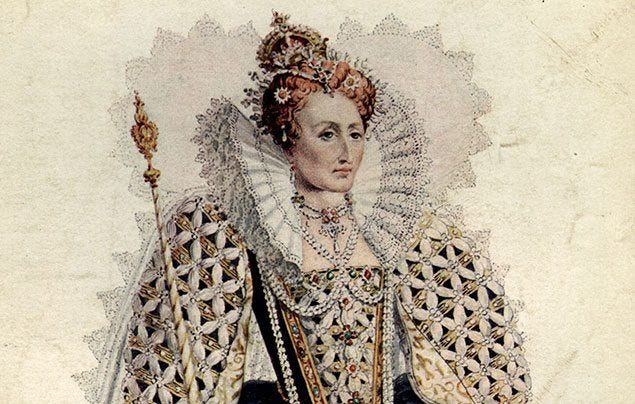Happy Queen Elizabeth Day!
For day twenty-seven of heritage history month, we celebrate the role of Queen Elizabeth I in the development of our Anglo-American past. This another one of those pivotal figures that would frustrate my RomCath (and Puritan!) friends, yet we must emphasize the importance of the Elizabethan moment in the making of our world.
Elizabeth ascended to the monarchy in the tense heat of a calamitous Tudor political crisis. Her father Henry VIII of course had been the catalyst, employed by God despite his sins, of English separation from the religious jurisdiction of Rome. After Henry came his son Edward VI, who controversially selected as his successor Lady Jane Grey in discordance with the rules of Succession, in order to stave off a Roman Catholic reversal of Protestant gains.
In a swift series of well-coordinated moves over only 9 days, Edward’s half-sister Mary Tudor captured and executed Queen Jane. A Roman Catholic reversal was implemented. Mary’s reign would only has five years and, having no child of her own, died with no means of preventing the ascension of her half-sister Elizabeth, a Protestant.
Elizabeth oversaw in England a time of relative peace through strength and cultural robustness. The Elizabethan half-century was a golden age of English culture, commerce, and religious debate. Elizabeth ruled as a moderate overseeing and largely deescalating religious tensions among both Roman Catholic and Puritan factions who sought, respectively, further implementation of their own visions.
It was during Elizabeth’s reign that Christopher Marlowe and Edmund Spenser would compose their masterpieces, and Shakespeare developed an imaginative vision of English life that would last centuries. Elizabeth would stand down Spanish expansionism into English territory and oversee the maritime achievements of adventurers such as Francis Drake and Walter Raleigh. She would give life force to the character and identity of the Church of England, supporting continental Reformers living in the precarious context of Romish consolidation.
Queen Elizabeth developed a persona of immense dedication to the well-being of her English people, recognizing her own self as the embodiment of their will and identity. Acknowledging the explosion of unrest that could ensue by her marriage and pursuit of a biological heir, she refrained from marriage totally. It was an act of her dedication to the stability of the realm. By not getting married, she kept her political opposition at bay, further securing the impenetrability of her government.
In a tumultuous world such as Tudor England, with cultural and political explosions preceding her reign and taking place across Europe, it is a testament to her wisdom (and that of her advisors) that she absorbed and therefore stifled immense political intensity that may have ripped apart the fragile British situation. Not only was she able to harmonize the civil and ecclesiastical politics of Tudor England, but she was able to arrange the conditions for the blossoming of English customs and social norms.
[At a time] when wars and seditions with grievous persecutions have vexed almost all kings and countries round about me, my reign hath been peaceable, and my realm a receptacle to thy afflicted Church. The love of my people hath appeared firm, and the devices of my enemies frustrate.




